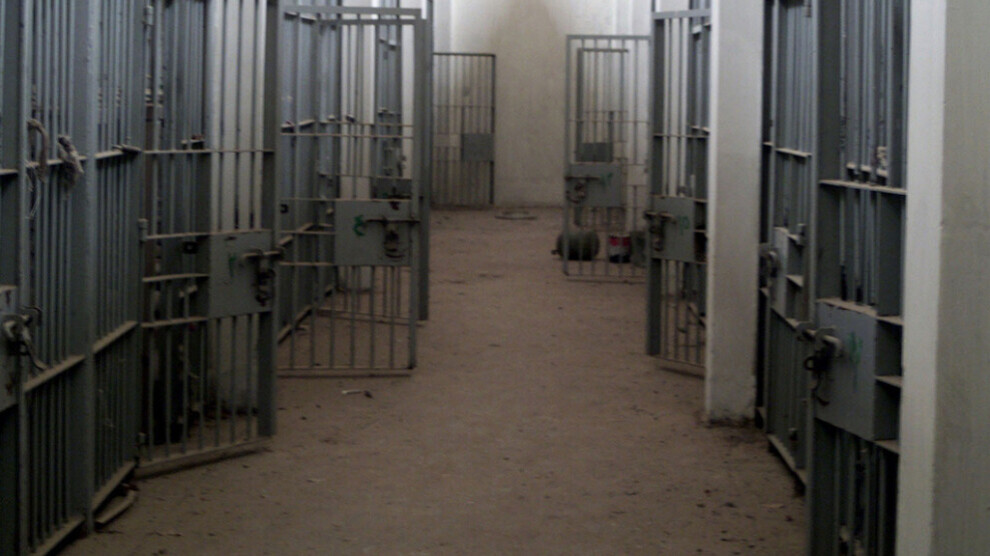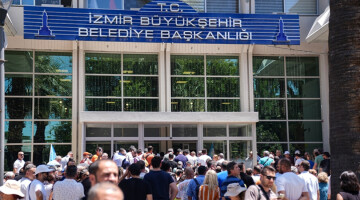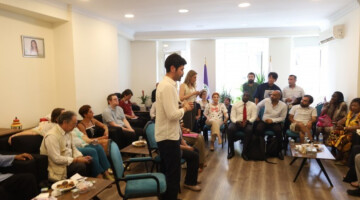The Kurdish author and activist Dr. Faiq Hamid was arrested in 2021 without any reason by units of the South Kurdistan’s ruling party, KDP, and spent several months in the dungeons of the Barzani party. In an interview with ANF, he spoke about the conditions in the KDP detention centers and the social developments in southern Kurdistan (northern Iraq).
Hamid is 42 years old, comes from the city of Bokan in eastern Kurdistan (Iran) and has lived in Piranshahr for 15 years. He is a veterinarian, author and translator. At the same time, he is involved in civil society organizations and has been on the board of an animal rights organization for five years. "Because of these activities, people from South Kurdistan approached me and said they had heard my name and wanted to work with me," he said, telling about his arrest by the KDP: "In the summer of 2021, during the Covid pandemic, I went to Hewlêr (Erbil) with a friend. One day, as we were walking through the streets of the city, we met a policeman. This policeman asked us very rudely what we were doing here and harassed us. We were then taken to the police station. There they asked the policeman: 'What happened, why did you bring them here?' The policeman who brought us to the police station said that we were Iranians and could therefore either be smugglers or agents."
70 people in a cell
Hamid continued: "In the KDP system, lying is as natural as drinking water. When we were brought before the judge, he asked me what I was doing there. I told him that I had been invited here and showed him my residence card. Then we were taken to prison. We were in a room with 40 people of different ages, including two doctors. Most of them had either been arrested for minor offenses or for no offenses at all. Then someone came and accused us. My friend had a pill in his pocket, and they said it was a drug. My friend told them to go to the pharmacy and check whether the pill was a drug or not. What I experienced and saw in the KDP prisons was very hard for me to bear. After 17 days, we were handcuffed and taken to a public square in the middle of the crowd. The noise of the police cars was so loud that people were frightened. After an investigation, they realized that we hadn't done anything. Then we were taken to a Saddam Hussein-era prison behind the building and put in a very dirty room. The room was nine meters long and five meters wide. There were about 50 of us in the room, and there was no remedy for any of the basic human needs. At its peak, there were 70 people in the cell. Then the number decreased again."
Drawing attention to the conditions of KDP prisons, Fayiq Hamid continued: "Every day they only opened the doors for five or ten minutes to meet all our needs. We were kept there for a week. 24 days later, we were transferred to another place. My friend thought that they would release us, but we saw that a KDP guard was waiting for us and took us to an unknown place. Then we were taken to Hewlêr Asayish (Public Order Forces) Centre, a much worse and dirty place. In KDP prisons, they want some prisoners to pressure other prisoners. After a long time, we appeared in court again. When the judge asked me a question, I told him that I had been in prison for two months without knowing why I had been arrested. I also said that if there was justice, I was supposed to file a complaint against the person who arrested us. Seven months later, one night before going to court, they woke me up and told me to get up, pack my things and leave.
‘They torture you to make you confess a crime you didn’t commit’
Speaking about torture in the prisons, Hamid said: "There are many reports of torture in KDP prisons. If the KDP needs a confession, they torture you to make you confess, or you are not released from prison until you confess. I have a friend who was in prison for three years because he didn't want to confess to a crime he didn't commit. All kinds of torture are used to force false confessions. For example, electric shocks, physical and psychological torture. They took a friend of ours as a witness and when he came back, he was limping. The KDP security forces really enjoyed torturing prisoners. They shamelessly said they tortured doctors, engineers, children and old people. Human dignity counts for nothing in KDP prisons. There are many human rights violations.
‘People are tortured at all hours of the day’
I don't take sides with anyone; I always stand on the side of the truth. I speak the truth, even if it is hard, and I am proud of my honesty. There was someone who spent eleven years as a political prisoner in Iraq, but he said that those eleven years were not as long as two weeks in the dungeons of the KDP. There is no place in the world as bad as the KDP Asayish Directorate in Hewlêr. It is labelled as a temporary detention facility, but you could be detained there for years. The directorate is designed for 240 prisoners, but there are 900 people in it. In this prison, people are tortured at all hours of the day and deprived of all their basic rights."
‘There is no state and no one as dictatorial as the Barzani family’
Hamid concluded with an assessment of the KDP system: "When the word dictator is mentioned, everyone thinks of Saddam Hussein's prisons. But some people who were imprisoned in our country during the time of Saddam Hussein say that the KDP prisons are much worse than the prisons of the Baathist regime. In my opinion, there is no state and no one as dictatorial as the Barzani family. The Barzani family has gathered a few profiteers around them, and they are distributing the stolen money and salaries, which are actually due to the people, among themselves. Many people are angry with the Barzani family, but they cannot speak out, let alone criticise the situation.
In the regions where the Barzani family rules, it is worse than in North Korea or any other country. The name of the KDP, 'Kurdistan Democratic Party', should be changed to 'Barzani Family Party'. All regional powers and states in the world are present in South Kurdistan. The KDP, the Barzani family, cannot protect South Kurdistan, but it can arrest a person who gives a glass of water to a PKK fighter and accuse him of espionage and treason. I am not the first person to criticise the Barzani family, there are many people in the world who share this criticism. The KDP and the Barzani family hire hitmen to kill opposition members. But the era of the Barzani family is over, dark days lie ahead of them."












